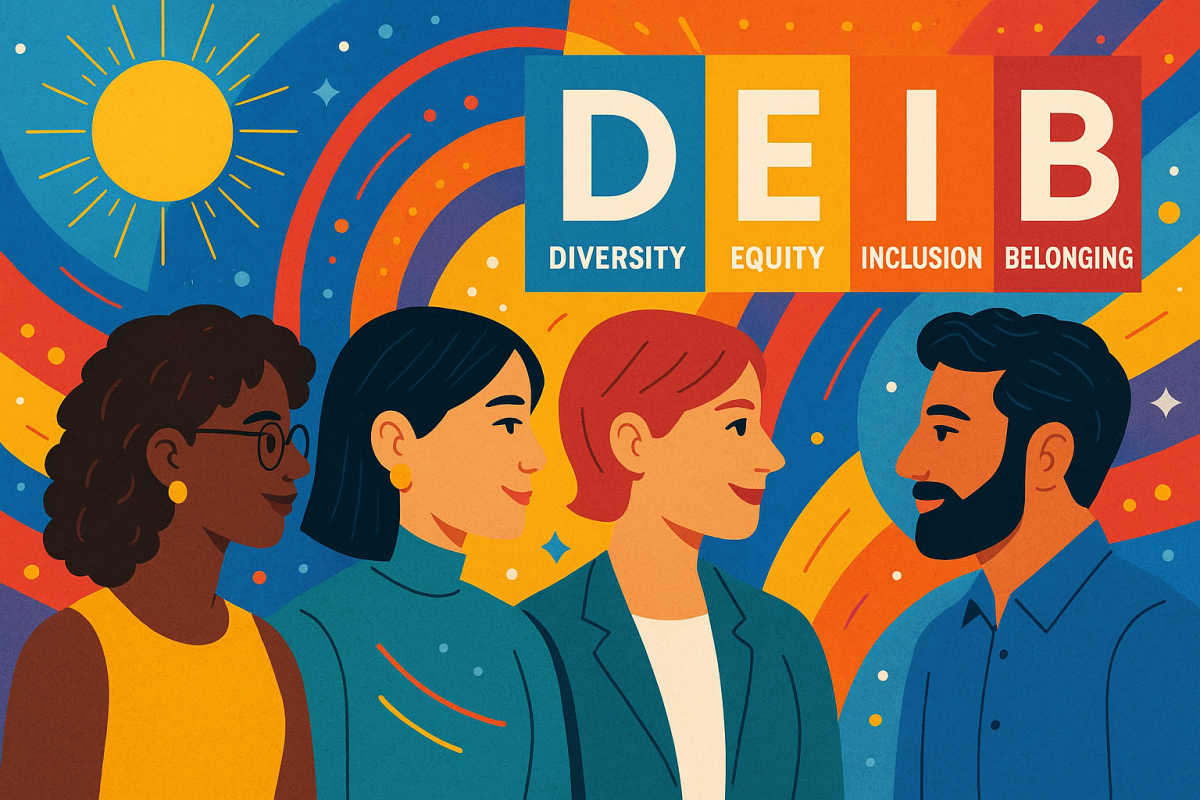Beyond buzzwords – how ESMT is redefining diversity, equity, inclusion, and belonging

Julieta Alvarez Caicedo never expected diversity, equity, inclusion, and belonging (DEIB) to become a “battle horse.” As ESMT’s DEI manager, she described standing “in the center of a hurricane” when public debates about DEIB exploded across Europe and beyond. This whirlwind moment set the stage for ESMT’s first event in its new Diversity Dialogues series, titled “Beyond buzzwords – the real impact of diversity, equity, inclusion, and belonging” and held on April 23, 2025.
Organized by the newly reconceptualized DEIBridge Action Council (pronounced “day bridge”), the event reaffirmed ESMT’s commitment to embedding DEIB principles deeply within its community and shaping the future of business education.
About the DEIBridge Action Council
Emerging from the legacy of the former Inclusive Leadership Roundtable, the DEIBridge Action Council represents a strategic, reenergized force for institutional transformation. Its past efforts even helped establish the DEI Manager position itself. Today, DEIBridge consists of 35 members from students, staff, and alumni, coordinated by Alvarez Caicedo.
The council’s key projects include:
- Diversity Dialogues series: hosting open conversations on urgent DEIB topics.
- Gender Equality Plan revision: reviewing and expanding ESMT’s existing plan to encompass broader categories beyond gender.
- DEIB event planning: organizing events like German Diversity Day and exploring additional initiatives.
Rather than ticking boxes, these initiatives reflect ESMT’s deliberate approach to fostering a living, evolving DEIB culture.
From the panelists: “what DEIB means to me”
The panel, moderated by Alvarez Caicedo, featured Alexander Hijmering, alumnus of the ESMT Executive MBA program and treasurer of the FORWARD Foundation: Legal LGBT+ Network; Rebecca Loades, director of MBA programs and DEIBridge Council member; and Qiao Zhang, program director of executive programs.
Hijmering recalled his activism in the Dutch legal sector, founding an LGBT employee resource group and feeling his professional life “soar” once he could bring his “whole self into the community.” Zhang reflected on her move from China to Europe, contrasting conformity-based belonging with the vibrant disagreements she encountered around German tables. Loades spoke of fairness as a personal value, shaped by her experiences navigating education as a gay woman in five different countries.
As Loades summed up, “How can each of us be genuine and true, without having to filter or edit ourselves?”
Understanding the current DEIB landscape
A central theme was the troubling weaponization of DEIB language. Panelists noted how the term “diversity” has been politicized, meaning very different things in different cultural contexts – race/ethnicity in the US, migration in Germany.
Hijmering emphasized that no single word can capture the fullness of DEIB efforts: “It’s the story we need to tell.” Loades suggested that the term “fairness” could resonate more universally across political divides. Zhang reflected on how words alone are often “pale” and stressed returning to purpose: rehumanizing workplaces, not just checking boxes.
The group agreed that organizations must shift away from defensive semantics and toward storytelling that evokes shared human values.
Yet, they also acknowledged deeper structural fears – of lost privilege, scarce resources, and cultural change – fueling the backlash. As Hijmering put it, “Before you level up, you have to fight the biggest monster.”
Pathways and strategies for strengthening DEIB
The panelists offered actionable strategies rooted in their experiences:
- Continuous dialogues via sustained, open conversations to build mutual understanding.
- Cultivating dialogue skills by building comfort with respectful disagreement while protecting psychological safety – what Loades called “the art of productive discomfort.”
- Transparency and accountability in reporting not just on pay gaps but on retention, advancement, and lived experiences.
- Storytelling and reframing to center narratives of fairness and human dignity.
- Expanding equity plans in the way that ESMT’s review of its Gender Equality Plan exemplifies how institutions can grow beyond gender to broader dimensions of identity.
- Focusing on the "how" to move beyond justifying DEIB to demonstrating everyday fairness in decisions.
- Building allyship by empowering those in majority groups to act and advocate.
As Zhang emphasized, “If we want power to be used for good, we need more good people to understand and use it.”
Audience reflections on the practice of DEIB
The audience added fresh complexity to the insights. One participant questioned how administrative systems’ reliance on binary gender categories could unintentionally exclude gender identities that do not adhere to the male/female binary. Panelists urged asking whether data collection practices truly serve inclusion.
Another raised the classic question: “What is fairness?” Loades acknowledged that fairness isn’t about blind sameness but about recognizing different life stories and adjusting accordingly. Zhang added that transparent decision-making – being clear about how and why choices are made – is critical to sustaining trust.
The conversation also confronted the tension between diversity and efficiency. While diverse teams may take longer to align, research shows they ultimately deliver more innovative, resilient outcomes when psychological safety is prioritized.
The broader commitment at ESMT
The Diversity Dialogues event revealed ESMT’s belief that DEIB work must be lived, not just discussed. In an atmosphere of rising polarization, the school is choosing to lean into critical dialogue, shared leadership, and strategic resilience.
By focusing on fairness, human dignity, and collective empowerment, ESMT is setting a new standard for what it means to lead in European business education – and beyond.
Through the ongoing efforts of the DEIBridge Action Council, the Diversity Dialogues series, and tangible policy reforms, ESMT continues to shape a more inclusive, resilient, and visionary future.
As Hijmering challenged the room: “What are we going to do – and how are we going to do it?”